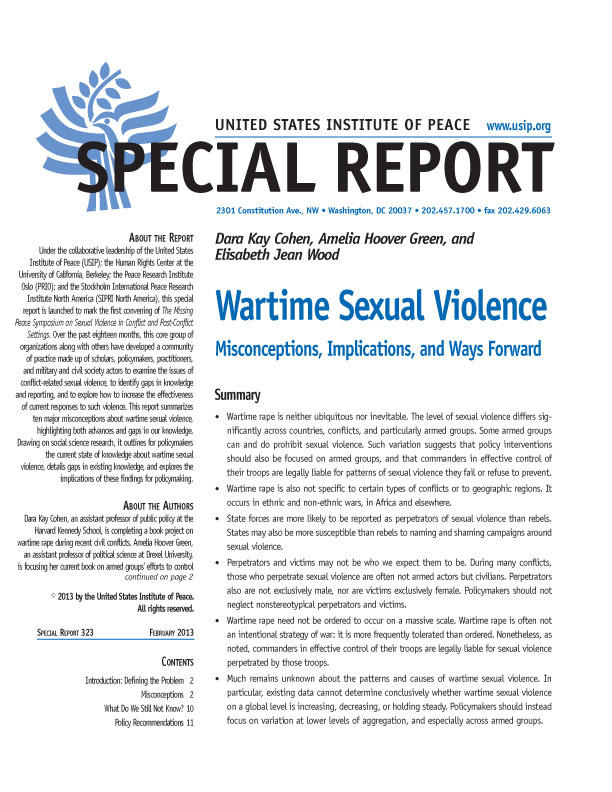Three top researchers explode myths about wartime sexual violence and conclude that rape in war is neither ubiquitous nor inevitable. Variation occurs across countries, conflicts, and armed groups. The fact that some commanders are able to prohibit sexual violence suggests that prevention is possible and interventions should be aimed at the level of armed groups
Summary
- Wartime rape is neither ubiquitous nor inevitable. The level of sexual violence differs significantly across countries, conflicts, and particularly armed groups. Some armed groups can and do prohibit sexual violence. Such variation suggests that policy interventions should also be focused on armed groups, and that commanders in effective control of their troops are legally liable for patterns of sexual violence they fail or refuse to prevent.
- Wartime rape is also not specific to certain types of conflicts or to geographic regions. It occurs in ethnic and non-ethnic wars, in Africa and elsewhere.
- State forces are more likely to be reported as perpetrators of sexual violence than rebels. States may also be more susceptible than rebels to naming and shaming campaigns around sexual violence.
- Perpetrators and victims may not be who we expect them to be. During many conflicts, those who perpetrate sexual violence are often not armed actors but civilians. Perpetrators also are not exclusively male, nor are victims exclusively female. Policymakers should not neglect nonstereotypical perpetrators and victims.
- Wartime rape need not be ordered to occur on a massive scale. Wartime rape is often not an intentional strategy of war: it is more frequently tolerated than ordered. Nonetheless, as noted, commanders in effective control of their troops are legally liable for sexual violence perpetrated by those troops.
- Much remains unknown about the patterns and causes of wartime sexual violence. In particular, existing data cannot determine conclusively whether wartime sexual violence on a global level is increasing, decreasing, or holding steady. Policymakers should instead focus on variation at lower levels of aggregation, and especially across armed groups.
About the Report
Under the collaborative leadership of the United States Institute of Peace (USIP); the Human Rights Center at the University of California, Berkeley; the Peace Research Institute Oslo (PRIO); and the Stockholm International Peace Research Institute North America (SIPRI North America), this special report is launched to mark the first convening of The Missing Peace Symposium on Sexual Violence in Conflict and Post-Conflict Settings. Over the past eighteen months, this core group of organizations along with others have developed a community of practice made up of scholars, policymakers, practitioners, and military and civil society actors to examine the issues of conflict-related sexual violence, to identify gaps in knowledge and reporting, and to explore how to increase the effectiveness of current responses to such violence. This report summarizes ten major misconceptions about wartime sexual violence, highlighting both advances and gaps in our knowledge. Drawing on social science research, it outlines for policymakers the current state of knowledge about wartime sexual violence, details gaps in existing knowledge, and explores the implications of these findings for policymaking.
About the Authors
Dara Kay Cohen, an assistant professor of public policy at the Harvard Kennedy School, is completing a book project on wartime rape during recent civil conflicts. Amelia Hoover Green, an assistant professor of political science at Drexel University, is focusing her current book on armed groups’ efforts to controrepertoires of violence against civilians. Both Cohen and Hoover Green were USIP Peace Scholars in 2008–09. Elisabeth Jean Wood, a professor of political science at Yale University, was a USIP Peace Scholar in 1993–94. Her work focuses on political violence, civil war, and social movements. She is completing a book manuscript titled Wartime Sexual Violence. The report was written by the authors in their personal capacities, and the views are theirs alone.[1]
1. The authors thank Michele Leiby, Xabier Agirre Aranbaru, and two anonymous reviewers for their comments. Dara Kay Cohen has received research support from USIP, the National Science Foundation, the Peace Research Institute of Oslo and the Folke Bernadotte Academy. Elisabeth Jean Wood has received research support from USIP, the Harry Frank Guggenheim Foundation, the Santa Fe Institute, and Yale University. Amelia Hoover Green has received research support from USIP, the Benetech Human Rights Program, and Yale University.
